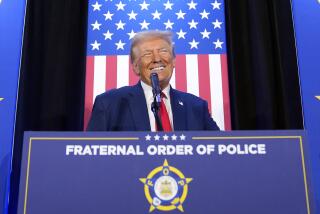Trump gives bipartisan criminal justice bill a boost
Reporting from Washington — President Trump, in his first attempt at bipartisanship since last week’s election, endorsed a bill Wednesday aimed at reducing some prison sentences and better preparing inmates for life after incarceration.
“Did I hear the word ‘bipartisan?’” Trump said in a White House announcement, surrounded by a small group of Republican lawmakers and law enforcement union leaders. “That’s a nice word.”
Trump’s backing could advance the legislation, long supported by a collection of advocates on the left and right, including Trump’s son-in-law and advisor, Jared Kushner.
One of the proposal’s biggest opponents, former Atty. Gen. Jeff Sessions, was ousted by Trump last week.
The bill would ease mandatory minimum sentences for some federal offenders, including ending mandatory life sentences for drug dealers and manufacturers convicted for the third time, instead imposing a mandatory 25-year sentence. The proposal would also give judges more flexibility in certain cases to curtail high minimum sentences.
In addition, the bill would retroactively reduce penalties for many inmates convicted of crack cocaine offenses, who have long been given higher sentences than people convicted of powder cocaine crimes. People convicted of offenses involving crack are disproportionately black, while many more of those convicted over powder cocaine are white.
A bill passed in 2010 eliminated the disparity in sentences for the two types of the drug, but did not affect thousands of people who had been sentenced under the previous law.
The bill would house more inmates closer to home — to promote family visits — and offer them more job-training opportunities in an attempt to rehabilitate them after they serve their sentences.
Some of those provisions could change as lawmakers try to muster support to bring the measure to the floor of the Senate, where it will require a supermajority of 60 votes.
The issue divides more libertarian-minded Republicans, who cite the potential to save money on incarceration and reduce the inmate population, from the law-and-order wing of the party, which has long promoted the stiffer penalties adopted during the war on drugs. The current proposal has been backed on the right by the conservative billionaires Charles and David Koch and on the left by groups including the American Civil Liberties Union.
Trump’s support is notable given that he has called for the death penalty for drug dealers to cement his tough-on-crime image.
In his remarks Wednesday, the president emphasized that some of the “toughest” people in law enforcement and politics, including Sen. Mike Lee (R-Utah) and several police unions, support the bill. Trump also cited support in the evangelical community, a political constituency he values highly. The bill gives religious groups a greater role in prison rehabilitation programs.
The issue also gives Trump an opportunity for a bipartisan win, something he has sought since Democrats won control of the House last week.
Trump’s statement puts pressure on Sen. Majority Leader Mitch McConnell of Kentucky to bring the bill to a vote in the Senate before the end of the year.
McConnell was noncommittal Wednesday, saying he would count the votes and then “see how it stacks up against our other priorities.”
An earlier version of the bill — which focused on prison rehabilitation but did not address changes to federal sentencing laws — has already passed the House, and the current bill is believed to have enough support to pass in that chamber.
“Redemption is at the heart of the American Idea, and that’s what this is about,” House Speaker Paul D. Ryan (R-Wis.) said in a statement issued after Trump’s announcement.
In addition to Kushner, celebrities and lawmakers have lobbied Trump on the issue.
“The stars have aligned politically and now would be a good time to do it, but I don’t know what happens,” said Sen. Lindsey Graham (R-S.C.), who attended Wednesday’s announcement and said he spoke with Trump about the issue Monday night.
Sen. Charles E. Grassley (R-Iowa), who heads the Judiciary Committee and sponsored the bill, said that with Sessions gone, the Justice Department now also supports it, clearing a big hurdle.
Grassley issued a joint statement with Illinois Sen. Richard J. Durbin, the No. 2 Democrat in the Senate and cosponsor of the measure, calling Trump’s endorsement “an important step.”
Follow the latest news of the Trump administration on Essential Washington »
Twitter: @noahbierman
Twitter: @jenhab
More to Read
Get the L.A. Times Politics newsletter
Deeply reported insights into legislation, politics and policy from Sacramento, Washington and beyond. In your inbox three times per week.
You may occasionally receive promotional content from the Los Angeles Times.












